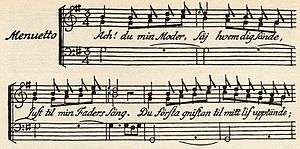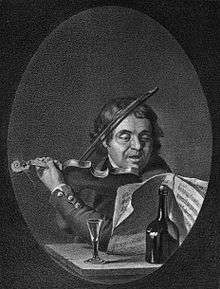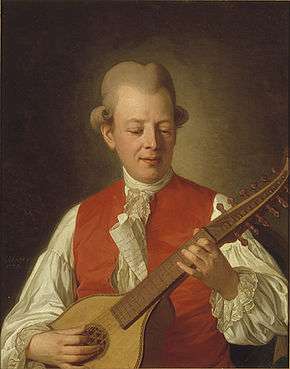Ack du min moder

 |
Melody of Epistle 23
|
| Problems playing this file? See media help. | |
Ack du min moder (Alas, thou my mother), originally written Ach! du min Moder, is one of the Swedish poet and performer Carl Michael Bellman's best-known and best-loved songs, from his 1790 collection, Fredman's Epistles, where it is No. 23. It begins as a lament, as Jean Fredman lies drunk in a Stockholm gutter outside the Crawl-in tavern, cursing his parents for conceiving him. Then he goes in, is revived by a stiff drink, and thanks his mother and father for his life.
The epistle's "soliloquy" was described by Oscar Levertin as "the to-be-or-not-to-be of Swedish literature".[1]
The epistle is subtitled "Som är et Soliloquium då Fredman låg vid krogen Kryp-In, gent emot Bancohuset, en sommarnatt år 1768." (A soliloquy in which Fredman lay outside the Crawl-in Tavern, right by the Bank, one summer night in the year 1768)
Context

Carl Michael Bellman is the central figure in Swedish song, known for his 1790 Fredman's Epistles and his 1791 Fredman's Songs. He played the cittern, accompanying himself as he performed his songs at the royal court.[2]
Jean Fredman is a fictional character and the supposed narrator in Bellman's epistles and songs, based on a real watchmaker of Bellman's Stockholm.[3] The epistles paint a picture of the demimonde life of the city during the eighteenth century, where strong drink and beautiful "nymphs" like Ulla Winblad create a rococo picture of life, blending classical allusion and pastoral description with harsh reality.[2][3]
Song
"Ack du min moder" is a song with six verses of twelve lines each, the last line being repeated as a refrain after a phrase on the flute. It is sung to a graceful melody in 3/4 time, marked Menuetto (Minuet).[3] In modern notation it is in E major. The rhyming pattern is ABAB-CCD-EED-FF.[4] The melody's origin is unknown.[5]
It begins as a lament, as Jean Fredman lies drunk in a Stockholm gutter outside the Crawl-in Tavern, cursing his parents for conceiving him. He goes into enough despairing detail to include a curse on the carpenter who made the "four-poster bed" (paulun), unless it was "perhaps upon a table" that he was brought into being:[2][3]
He imagines telling his mother that she should have locked and barred her door against his father. Then the sun starts to warm him, and at last the tavern door opens, and he can go inside:[2][3]
- Men krogdörn öpnas, Luckorna skrufvas; Ingen i staden klädd.[6]
- But the pub door is opening, the shutters are undone; no-one in the town is (yet) dressed.
He staggers down the steps to the bar.[2][3]
His creaking joints are "lubricated" with a stiff drink, and he comes round to thanking his mother and father for his life.
- Nu ska de styfva leder blifva smorda, / Smorda all ihop.[6]
- Now my stiff limbs are lubricated, / all lubricated at once.
The song thus traverses the emotions from an alcoholic's suicidal despair to delight in life. The formal structure of the verses reflects these moods. For example, verse 2 has four lines beginning "Tvi ..." ("A curse upon"); verse 6 has three lines beginning "Tack..." ("Thanks"), picking up the last line of verse 5.[2][3][4]
Reception
The virtuoso soliloquy was described by the poet and literary historian Oscar Levertin as "the to-be-or-not-to-be of Swedish literature".[1][7]
"Ack du min moder" is described by the Bellman Society as one of the most admired epistles, travelling as it does from the emotional depths of the gutter to the skies in the most drunken state of bliss.[8] When the epistle is performed, it is to the public's "delight" as a "masterpiece".[9]
Anders Ringblom, writing in the cultural newspaper Tidskrift, calls the epistle an unvarnished picture of the old watchmaker as the rising sun warms him up, the tavern opens, and life once again becomes worth living.[10]
City walks in Stockholm's Gamla stan take tourists to visit the Krogen Kryp-in on Järntorget, the Crawl-in Tavern, alluded to in "one of the best known of Fredmans Epistles, No. 23."[11]
It appears on the 1969 studio album Fred sjunger Bellman by Fred Åkerström, re-released on CD in 1990.[12] It also featured on Mikael Samuelsson's Sjunger Fredmans Epistlar[13] and on "19 Vackra & Omtyckta Svenska Visor Vol.2" in 2016.[14]
Students of Swedish literature are expected to study Fredman's Songs and Epistles, "especially Fredman's epistle nos. 23, 33, and 81."[15]
References
- 1 2 Britten Austin, page 61
- 1 2 3 4 5 6 "Carl Michael Bellmans liv och verk. En minibiografi (The Life and Works of Carl Michael Bellman. A Short Biography)" (in Swedish). The Bellman Society. Retrieved 25 April 2015.
- 1 2 3 4 5 6 7 Britten Austin, 1967. Chapter 3: Fredman's Epistles, pp 61-93.
- 1 2 Hassler and Dahl, 1989, page 47
- ↑ "Fredman's Epistel N:o 23". Bellman.net. Retrieved 17 March 2016.
- 1 2 3 4 "N:o 23 FREDMANS EPISTEL Som är et Soliloquium då Fredman låg vid krogen Kryp-In, gent emot Banco-huset, en sommar-natt år 1768.". Bellman.net. Retrieved 5 March 2016.
- ↑ The original source is mentioned in Levertin, Oscar I. (1899). Introductory Essay to Fredmans Epistles (in Swedish).
- ↑ Nilsson, Hasse. "Om Fredmans epistlar och sånger". The Bellman Society. Retrieved 5 March 2016.
- ↑ "Hwad Behagas?" (PDF). Bellmanssällskapets Medlemsblad. Bellman Society (3). 2007. Retrieved 5 March 2016.
- ↑ Ringblom, Anders. "Extas och kaos "Wår lyckelige Skald"" (in Swedish). Tidskrift. Retrieved 5 March 2016. From Parnass, volume 3, issue 3.
- ↑ "Vandringar i Gamla Stan". Baggus Vandringar. Retrieved 5 March 2016.
- ↑ "Fred sjunger Bellman". Svensk mediedatabas. Retrieved 23 March 2014.
- ↑ "Mikael Samuelson - Sjunger Fredmans Epistlar". Discogs. Retrieved 12 March 2016.
- ↑ Tomas Blank. "19 Vackra & Omtyckta Svenska Visor Vol.2" Blank, 2016.
- ↑ "LITTERATURLISTA V15 LV1150 Moment 2: Klassiker ur Sveriges litteratur". Gothenburg University. Retrieved 5 March 2016.
Sources
- Bellman, Carl Michael (1790). Fredmans epistlar. Stockholm: By Royal Privilege.
- Britten Austin, Paul. The Life and Songs of Carl Michael Bellman: Genius of the Swedish Rococo. Allhem, Malmö American-Scandinavian Foundation, New York, 1967. ISBN 978-3-932759-00-0
- Britten Austin, Paul. Fredman's Epistles and Songs. Stockholm: Proprius, 1990 and 1999.
- Hassler, Göran; Peter Dahl (illus.) (1989). Bellman – en antologi [Bellman – an anthology]. En bok för alla. ISBN 91-7448-742-6. (contains the most popular Epistles and Songs, in Swedish, with sheet music)
- Hassler, Göran (1989). Bellman II – en antologi [Bellman – an anthology]. Peter Dahl (illus.). En bok för alla. ISBN 91-7448-837-6. (contains the remaining Epistles and Songs, in Swedish, with sheet music)
- Kleveland, Åse (1984). Fredmans epistlar & sånger [The songs and epistles of Fredman]. Svenolov Ehrén (illus.). Stockholm: Informationsförlaget. ISBN 91-7736-059-1. (with facsimiles of sheet music from first editions in 1790, 1791)
- Massengale, James Rhea (1979). The Musical-Poetic Method of Carl Michael Bellman. Stockholm: Almqvist & Wiksell International. ISBN 91-554-0849-4.
